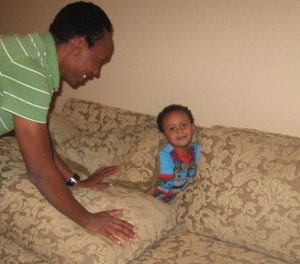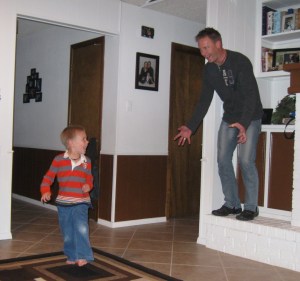The following “nuggets” about predator games with young children concern brain training that will build regulation of fear and aggression. They are compiled from lectures I heard in 2009 by Dr. Wilder and from my own experiences. This is not just about psychological training, but also is actual physical training in the brain.
Predator games are very important as they can be very positive or very negative. In general, Daddy is the best trainer–if he knows what to do and how to do it. The positive results come from a secure bond with Daddy. If one is teachable it is easy to learn.
Stop when child says or shows they want to
A few months after turning a year old, when a child can walk well and run fairly well, the easiest way to play predator games is by acting like we are going to “get them,” causing them to run away with glee. The adult should modify the intensity of the chasing, etc. according to the age of the child and the child’s emotional capacity. The “goal” of the game is for the child to go to the highest level of joy for his age and capacity, either say, “no” or “stop,” (which can be non verbal) rest a few seconds and go again.
It is vital for the parent to stop when the child says to or upon seeing the non-verbal signs. Not stopping is very damaging. In the beginning, the child may not know how to slow himself down, rest quickly and be ready to go again. The adult may have to help.
If the child doesn’t say stop or no, the parent must discern when the child is about to go into overwhelm, the stop and help the child rest for a few seconds, then go again. The adult should be able to tell by the sounds of the joy, squealing and body language when the child is at their peak of joy, even if he doesn’t say no or stop.
The adult needs to have a joyful relationship with the child
In playing these games, there is an assumption that the adult and child have a joyful relationship not a fear bond. It is supposed to feel a bit scary to the child, but they already know the adult is a safe and loving person.
If, when playing predator games, the adult pushes the stimulation (tickling, chasing, scaring, etc.) until the child cries, this is very harmful. Please do not do this. It is not funny; it is abusive. The brain training is for the child to learn the life skills of knowing when to say stop, when to stop if someone else says stop, and how to know when they or others are near overwhelm.
Examples of Predator Games
When first walking and running (15-18 months): Having eye contact with the child, stomp your feet lightly, clap your hands lightly, light up your face and say, “I’m gonna get you!” As she turns to run, act like you are chasing her. She will look backwards to watch you so be careful to help her watch where she is running. Just go a short distance and then either pick her up and swing her around, hug her or just stop. Rest a few seconds and go again. Help her regulate if needed. It should be great fun.
When the child is around 2 or so (and depending on the child’s personality) and knows the routine, Daddy can pretend to be a mean pirate who chases, grabs up and throws onto the bed or couch. He can pretend to be a snake or wild animal or put something on his head that looks a bit scary. All these work well through the preschool years. If they say no or stop, do it instantly. Sometimes they need help with the stop before they can say it. Sometimes they will run to Mommy or jump on the couch to rest a few seconds.

The adult can hide and when the child comes to find them, they can jump out and say, “Boo!” Or the child can hide and jump out at the adult. This one might need to be “taught” slowly, as getting jumped out at can be more scary. Remember it is for great fun– not truly scaring the child.
Dads can continuing this training with older children by doing such activities as extreme adventures, backpacking, camping, survival training.
Extra notes from Dr. Wilder
The earthly father and relationships: During 12-18 months, a child with a secure bond with mother is more interested in father’s emotional availability. Loving protective care by father from 12-18 months internalizes security for life. The father and child have to already be bonded. This bond from 12-18 months is central to regulating fear and aggression responses. How the child learns this regulation will affect sexual impulses later. Not knowing how to regulate fear and aggression is a cause of domestic violence, verbal abuse, etc.

Father models regulation of fear/anger/aggression by playing properly with tickling, ‘I’m gonna get you,’ and wrestling type games. It’s even more important for a son’s brain development. This takes place in interactive regulation of fear, aggression and sexual impulses. The father cannot do it if he is a mess.
When children who have not had this training reach adolescence, twice as many control nerve cells die (apoptosis) than children who had the training. If father is critical and angry and does not train and the mother is dismissive (low joy), four times as many cells will die. These are factors that build a predatory psychopath.
Under-controlled, aggressive children become real trouble when they reach adolescence. The child can have no conscience, not read faces, and won’t learn from their mistakes.
This training is all about knowing when to stop. The result of not stopping is that we overwhelm others. Overwhelming others emotionally, verbally or physically is controlling—something God never does. He could blow our circuits any time He wanted to, but He doesn’t.
God gives us the freedom to chart our own path and make our own choices. He never imposes His will on us.
Not knowing when to stop is the root cause of abusive and controlling use of power by authorities. Leader’s who do this are abusive and it is not Biblical.
We trust people who know when to stop. If you want to build trust, know how to stop. Men who do not are armed and dangerous. We do not want to get close to people who overwhelm us and do not know when to stop.
Learn what overwhelm feels like to you and what the signs are in others. These signs can be non verbal. Watch eyes and faces. The changes can be very minute. Watch body language. We can overwhelm others even we are not overwhelmed ourselves.
SUMMARY
Please encourage all Daddies (or joy-bonded male substitutes) to play these kinds of games with their children. If you see anyone tickling a child until he cries, intervene. It is not okay. Mommies can play the games, and should, but they work best with Daddy.

Leave a Reply